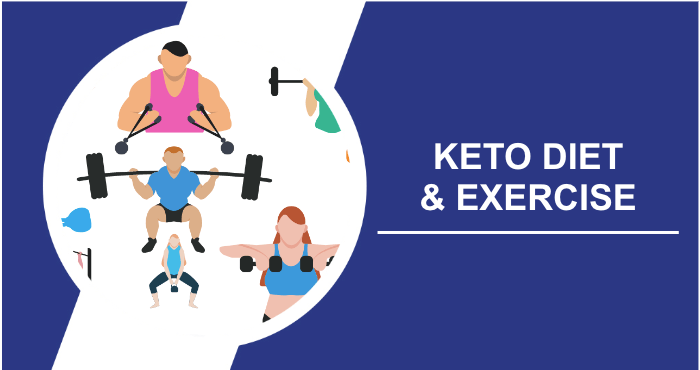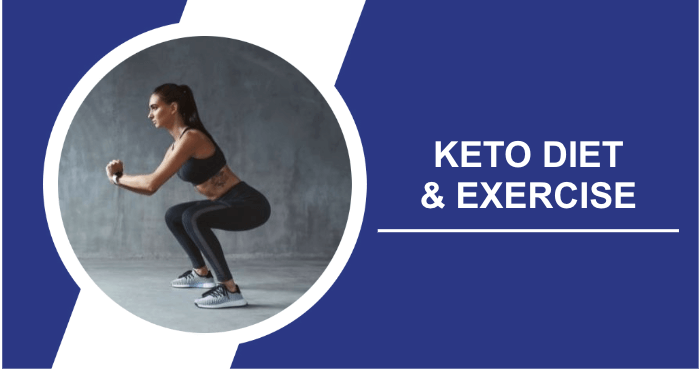Whether you follow the keto diet or not, exercise has always been a key strategy for staying healthy and fit. However, does exercise speed up weight loss when you’re on ketosis? Ketosis is a metabolic state in which the body burns fat for fuel rather than glucose. This ultimately leads to weight loss, which is one of its best benefits. Here’s all you need to know if you want to lose more weight on keto by adding exercise to your daily routine.
Does Exercise Accelerate Weight Loss In Ketosis?
When following a keto diet, the body enters a state called ketosis. The impact of exercise on this process varies depending on the type performed. Low-intensity exercise that raises the heart rate without requiring bursts of energy can facilitate the transition to ketosis without taxing the body.
While it might be achievable to resume your exercise routine after beginning the keto diet it is advisable to focus on lower-intensity workouts initially. Taking an approach to reintroducing high-intensity exercises seems like a sensible choice.
What Exactly Is a Keto Diet?
The keto diet is often described as a culinary journey for the adventurous. It takes you into the world of fats and low-carb living. Think of your body as a detective that switches from relying on carbohydrates to using stored fats for energy.
Ketosis is a metabolic state in which the body burns fat for fuel rather than glucose. This ultimately leads to weight loss, which is one of its best benefits.
This transformative experience not only alters your eating habits but also unlocks mental clarity and long-lasting vitality. It’s as if you become a health enthusiast exploring new possibilities within your own body.
What Should I Be Aware of When Following a Ketogenic Diet?
Your body, as the captain of this voyage, needs hydration and electrolytes as it adjusts to the new way of life. Be prepared for the so-called ‘keto flu’, which can cause temporary fatigue and cravings in the early stages.
When it comes to deciding what to eat, embrace the range of carbohydrate options. Stay cautious about hidden sugars that might be hiding in unexpected sources. Keep in mind that achieving long-term success on this path requires finding a balance between your macronutrients being mindful, with your planning and paying attention to the signals your body sends you.
Keto Exercise: Recommended Workout Choices
When starting a keto diet, it’s important to prioritize effective exercise. From high-intensity workouts, focus on low to moderate-intensity aerobic activities such as jogging, cycling or swimming. These are good choices when you’re still adjusting to the low-carb diet.
Once you become more accustomed to the keto lifestyle, you can start thinking about incorporating intense workouts into your routine. However, it’s crucial to proceed with care. Exercises like weightlifting or callisthenics might feel more demanding. Make sure to introduce these higher-intensity exercises and be mindful of any new limitations you may encounter.
Top Exercises to Aid Weight Loss on the Keto Diet
Moderate-Intensity Aerobic Exercise
Moderate-intensity aerobic exercise is often recommended for people on the ketogenic diet. These exercises involve raising your heart rate to 50-75% above your resting rate for a total of 150 minutes per week, which qualifies them as moderate-intensity exercise.
There are activities that fit into this category, like running, practicing yoga, riding a bike, or swimming at a moderate pace. While these exercises may not directly improve health and endurance, they can be beneficial for individuals who have reduced their carbohydrate intake.
High-Intensity Interval Training (HIIT)
Another effective exercise option is High-Intensity Interval Training (HIIT), which involves alternating bursts of intense exercise with longer intervals of lower-intensity activity. For example, a typical HIIT session might consist of two 30-second intervals of high-intensity sprinting followed by a 15-second interval of walking, repeated until exhaustion.
Although HIIT can provide weight loss advantages, the optimal amount needed may differ for each individual. Additionally, it’s worth considering that certain individuals might encounter challenges when attempting high-intensity interval training while following a keto diet. It is crucial to recognize and respect your body’s limitations, avoiding strain that could result in injury.
Building Lean Muscle Mass through Strength Training
Strength training is an essential part of any workout routine when it comes to building muscle. This type of exercise focuses on pushing your muscles to their limits and allowing them to recover before subjecting them to further stress. Over time, this progressive resistance leads to muscle growth. For people on low-carb diets such as keto, strength training can be challenging, especially if it involves fast repetitions with heavy weights.
If you’re following a keto diet, it’s best to opt for strength training programs that prioritize preserving muscle tone rather than aiming for rapid muscle mass gains. When you begin a keto diet, it is advisable to focus on strength training. It’s crucial to keep in mind that if your ultimate objective is to increase muscle mass, you should gradually work towards that goal.
The Positive Impacts of Following a Ketogenic Diet on Athletic Performance
Increased Fat Metabolism
The ketogenic diet has gained popularity due to its ability to induce ketosis, a metabolic state in which the body uses fat as an energy source instead of carbohydrates (sugar). When combined with exercise, this diet is believed to increase fat burning by accelerating the depletion of carbohydrate-based energy reserves.
Enhanced Muscle Recuperation
Muscle repair training focuses on rebuilding and restructuring muscle cells and fibers in the tissue. When muscles are stressed through exercise, they undergo a recovery process during rest periods, which involves self-repair and the formation of muscle fibers.
Ketogenic diets can potentially speed up this process, particularly as the liver produces ATP during ketosis when it metabolizes fat for energy. This metabolic state has been shown to enhance muscle recovery by helping to replenish muscle glycogen stores.
Enhanced Stamina
While engaging in high-intensity exercise on a diet may present some challenges, there is evidence indicating that individuals following this eating plan might experience improved endurance levels during low or moderate-intensity workout sessions. These findings have been observed among endurance athletes, like marathon runners and multistage cyclists.
It is also thought that ketogenic diets, which are high in fatty acids, promote increased oxidation. This is the process by which acids are broken down to produce energy for the body.
Tips to Follow When Exercising on a Keto Diet
Here are some tips to keep in mind when exercising while on a diet:
Determine Your Calorie Target
One important aspect of combining exercise with a keto diet is establishing your daily calorie goal. Remember that 3,500 calories equals one pound of body weight. If you want to lose one pound a week, reducing your calorie intake by 500 calories is a good starting point.
If you’re looking to shed pounds, it’s advisable to collaborate with a healthcare expert. Additionally incorporating calorie expenditure tracking into your calorie reduction plan could be beneficial. Numerous applications are accessible to assist you in establishing and attaining your calorie objectives invest some effort in researching and identifying the ideal app for monitoring your caloric intake.
Stay Well Hydrated
When we exercise, our bodies tend to sweat more, which can lead to dehydration as we lose water. To prevent dehydration, it’s important to increase your water intake.
Making sure to stay hydrated by consuming an amount of water is essential. It not only prevents dehydration but also enhances our endurance and eases the strain on our heart while exercising. The specific quantity of water required varies from individual to individual. A general rule of thumb suggests aiming for approximately eight glasses per day.
Eat Enough Protein
Protein also plays a role in our daily diet and becomes even more critical when we exercise regularly. If you’re limiting your protein sources, one option is to consider incorporating protein powders into your routine. Protein powders come in different flavours and can be mixed with milk or other liquids. These products offer levels of protein to suit individual preferences and dietary requirements.
Avoid Overexertion
It’s crucial to keep in mind, particularly if you’re new to the keto diet, that your physical capabilities might be slightly impacted. Avoid pushing yourself to regain your level of activity. Instead, concentrate on engaging in intense workouts for a few weeks, as you might notice a decline in performance. As you slowly adapt to the keto diet, take measures to achieve your desired level of exercise intensity.
How Can I Enhance My Performance While On a Keto Diet?
Keto diets can vary in terms of the proportions of macronutrients (fat, carbohydrates and protein) and how strictly these proportions are followed. There are keto variations designed for different types of exercise, which we will discuss below.
- The Targeted Ketogenic Diet (TKD) is quite similar to the Cyclical Ketogenic Diet (CKD). It permits the consumption of carbohydrates at any point during high-intensity workouts. Throughout periods individuals adhere to a standard ketogenic diet. 25 50 mg of carbohydrates primarily in the form of glucose and dextrose are ingested roughly 30 minutes before engaging in exercise. Many people opt for glucose tablets, commonly used by individuals managing diabetes to regulate their blood sugar levels. Additionally, the targeted ketogenic diet emphasizes avoiding carbohydrate intake before and after physical activity.
- The Cyclical Ketogenic Diet (CKD) involves following a diet for five days a week, followed by two days of increased carbohydrate intake. During these two high-carbohydrate days, ketosis is not maintained, allowing for intense exercise on those specific days. This diet is popular with people who want to build muscle.
- The High Protein Ketogenic Diet (HPKD) is an eating plan for individuals who engage in bodybuilding and weightlifting. Within this diet, 30% of the daily calorie consumption is derived from protein. To illustrate, if a man follows a 2,500-calorie-per-day diet, this means consuming about 750 calories or 83 grams of protein each day. Considering the elevated protein needs associated with bodybuilding, it is logical to increase protein intake. However, it is important for individuals with kidney issues to avoid protein diets.
Supplements to Enhance Exercise Performance While Following the Keto Diet
Creatine
Creatine is a naturally occurring amino acid found in muscles. Its main role in the body is to help recycle compounds that provide energy for bodily functions. By increasing your creatine intake, you can boost your energy reserves and promote muscle mass and growth.
Protein Powders
Protein powders are available in flavors and strengths and are made from different sources. The popular protein sources used in these powders include soy and whey. However, if soy and whey proteins aren’t suitable for you, there are protein sources, like peas, hemp and eggs, that can be used in the production of powder.
Pre Workout Supplements
Consider incorporating a pre-workout supplement into your daily training routine. These supplements often contain creatine along with amino acids and caffeine, which can provide an extra energy boost.
They also usually contain nitric oxide, which increases oxygen uptake and blood flow to the muscles, ultimately improving endurance. It’s a good idea to try different supplements before settling on one that works best for you on a regular basis.
What are the best exercises for a keto diet?
When it comes to maintaining fitness while following a keto diet, imagine your body as an oiled fat-burning machine. The key is to find the exercise routine that supports your goals. Consider activities like walking or yoga as the calming purr of an engine that promotes relaxation and aids in fat utilization.
On the other hand, high-intensity workouts like weightlifting and sprinting supercharge your metabolism and give you a sense of invincibility. Remember, consistency and paying attention to your body’s cues are key factors in guiding you on this unique keto-powered fitness adventure where you can embrace challenges and achieve success, whether it’s flowing gracefully through yoga poses or setting new weightlifting records.
What Side Effects Can a Keto Diet Have?
Starting a diet can be quite an exciting journey, but it’s not always a smooth ride. As your body adapts to this way of fueling itself, you might encounter what is commonly referred to as the ‘keto flu’. During this phase, you may experience fatigue or mood swings, which could momentarily affect your progress.
Some people also experience side effects such as bad breath (keto breath’) or possible digestive problems. But don’t worry! These are just temporary bumps in your keto journey. By staying hydrated, replenishing electrolytes and following a planned approach, you can navigate through these challenges and reach the bright shores of ketosis.
Frequently Asked Questions
Can I exercise on a keto diet, and is it effective for weight loss?
Definitely! Incorporating exercise and following a keto diet can go hand in hand when it comes to losing weight and improving well-being. Although it might require a bit of tweaking, numerous individuals have seen remarkable outcomes by combining these two approaches.
Will I have enough energy to exercise on keto?
At first, you may notice a drop in energy as your body adjusts to ketosis. However, as you become more keto-adapted, you can maintain energy levels for exercise. Consider targeted ketogenic diets for additional support.
How do I find the right balance of keto and exercise for my goals?
It’s important to take things slowly and allow your body to adjust. Seeking advice from a healthcare professional or dietitian who can provide guidance tailored to your individual goals and requirements is also recommended.
Can I build muscle on a keto diet?
Yes, you can build muscle on a keto diet! Just be mindful of your protein intake and consider high-protein keto options if your goal is muscle growth.
Can I lose weight faster on keto by working out intensely?
While engaging in physical activity can be beneficial for weight loss, it is crucial to find a healthy balance. The high intensity of exercise may pose challenges, for individuals following a keto diet hence gradual progress should be prioritized.
Conclusion
Following a keto diet and exercising are methods for losing weight, burning fat and maintaining overall fitness. Combining these two approaches allows you to reap the health benefits they offer. However, if you’re starting a keto diet while already exercising (or starting an exercise routine while following a keto diet), it’s essential to start at a lower intensity level. This will give your body time to adjust to the changes before gradually increasing the intensity over time.
Resources
- McSwiney, F.T., Wardrop, B., Hyde, P.N., LaFountain, R.A., Volek, J.S., & Doyle, L. (2018). “Keto-adaptation enhances exercise performance and body composition responses to training in endurance athletes.” Metabolism-clinical and Experimental, 81, 25–34. doi:Link.
- Journal of the International Society of Sports Nutrition. (2019). “Effect of a four-week ketogenic diet on exercise metabolism in CrossFit-trained athletes.” Link.
- Ma, S. and Suzuki, K. (2019). “Keto-Adaptation and Endurance Exercise Capacity, Fatigue Recovery, and Exercise-Induced Muscle and Organ Damage Prevention: A Narrative Review.” Sports, 7(2), 40–40. doi:Link.
- Cox, P.J., Kirk, T., Ashmore, T., Willerton, K., Evans, R.D., Smith, A.A., Murray, A.J., Stubbs, B.J., West, J.A., McLure, S., King, M., Dodd, M.S., Holloway, C., Neubauer, S., Drawer, S., Veech, R.L., Griffin, J.L., & Clarke, K. (2016). “Nutritional Ketosis Alters Fuel Preference and Thereby Endurance Performance in Athletes.” Cell Metabolism, 24(2), 256–268. doi:Link.
- Stokes, T., Hector, A.J., Morton, R.W., McGlory, C., & Phillips, S.M. (2018). “Recent Perspectives Regarding the Role of Dietary Protein for the Promotion of Muscle Hypertrophy with Resistance Exercise Training.” Nutrients, 10(2), 180–180. doi:Link.
Mark Willson, holding a Ph.D., functions as a psychotherapist in Washington, D.C. His specialized fields encompass addiction, anxiety, depression, as well as sexuality and interpersonal connections. Dr. Willson holds the distinction of being a diplomat for the American Board of Addiction and Anxiety, further serving as a certified counselor and addiction specialist.
Aside from his personal professional endeavors, Dr. Wilson has engaged in roles as an author, journalist, and creator within substantial medical documentary projects.
Isabella Clark, Ph.D., held the position of a professor within Emory University’s School of Medicine, working in the Department of Mental Health and Nutrition Science. Alongside this role, she served as a research associate affiliated with the National Research Center. Dr. Clark’s primary area of research centers on comprehending the mechanisms through which adverse social encounters, encompassing prolonged stress and traumatic exposure, contribute to a spectrum of detrimental mental health consequences and coexisting physical ailments like obesity. Her specific focus lies in unraveling the reasons behind the varying elevated susceptibility to stress-linked disorders between different genders.






